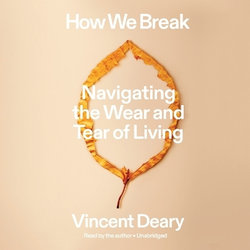As a therapist, Vincent Deary has a ringside seat at the theater of change, having witnessed firsthand how it's done, and what it is that gets people stuck. As a researcher and reader, he knows that there are centuries of thought about habit and change, from the most ancient ethical and spiritual writings up to the most modern schools of psychotherapy and neuroscience. Deary's three freestanding books bring these insights together, synthesizing them to produce a coherent vision of what human beings are like-how we work, how we break, and how we mend.
At the heart of these books is the insight that most of our lives are lived automatically. Consciousness has, on the whole, little to do with daily life. Moment to moment, we rely mostly on the vast store of automated practices that are the cognitive unconscious of modern neuroscience. This cognitive unconscious is distributed not only through our nerves and muscles, but also through our environment, our social network, and our culture. Human existence is, as such, largely reliant on scaffolding, an intricate supporting framework of cognitive prosthetics, both personal and communal. The purpose of the How to Live trilogy is to bring these hidden mechanisms to light and to show them at work beneath our daily life, in all our wounding and our healing.
The second book of the How We Live trilogy moves away from the journey of normal change, with all its resistance and excitement, and focuses on the journeys that get derailed, dealing with the common ways in which we break: trauma, anxiety, depression, doubt, despair, or simply getting into a rut. How We Break shows how the human animal gets stuck, not because of some pathology, but because of the nature of the creatures that we are and the kinds of processes that constitute our being. It shows that these derailments are a normal part of being human. The last chapter, Escape Velocity, discusses the tension between our inertia and our need for change, thereby setting the scene for the third book, How We Mend, where we look at deliberate change and where we watch people getting better.




Share This Audio CD: